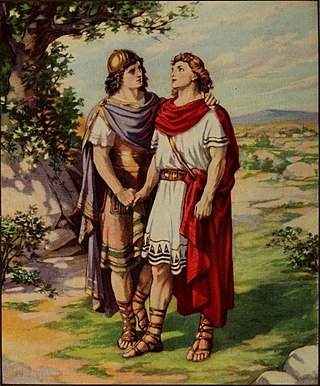Related Research Articles

Jonathan is a common name given to males which means "YHWH has given" in Hebrew. The earliest known use of the name was in the Bible; one Jonathan was the son of King Saul, a close friend of David.
Stephan is a male given name, a variant of Stephen.
Hans is a Germanic male given name in Afrikaans, Danish, Dutch, Estonian, Faroese, German, Norwegian, Icelandic and Swedish-speaking populations. It was originally short for Johannes (John), but is now also recognized as a name in its own right for official purposes. The earliest documented usage was in 1356 in Sweden, 1360 in Norway, and the 14th century in Denmark.
Castle is an English surname denoting someone who worked at or resided at or near a castle. Notable people with the surname include:

Strauss, Strauß or Straus is a common Germanic surname. Outside Germany and Austria Strauß is usually spelled Strauss. In classical music, "Strauss" most commonly refers to Richard Strauss or Johann Strauss II.
Lill is a surname. When borne by Estonian individuals, it means "flower". People with the surname Lill include:
Gregor is a masculine given name. Notable people and fictional characters with the name include:

Alfred is a masculine given name of English origin, a modern descendant of the Anglo-Saxon name Ælfræd, formed from the Germanic words ælf, meaning "elf", and ræd, meaning "counsel". Its feminine form originating from Romance languages is Alfreda, and diminutives of Alfred include Al, Alf, Alfy, Alfie, Fred, and Freddy. After the 11th-century Norman Conquest, many variants of the name emerged, most of which were not carried to the modern day. Today, Alfred is still in regular usage in a number of different regions, especially Great Britain, Africa, Scandinavia, and North America. It is one of the few Old English names that came into common use in Europe. Its name day is the 3rd of January both in Norway and Sweden.
Toni, Toñi or Tóni is a unisex given name.

Oscar or Oskar is a masculine given name of English and Irish origin.
Hannes is a masculine given name and a diminutive of Johannes or Hannibal.
The name Kai or Cai has various origins and meanings in different cultures:
Jürgen or Jurgen is a popular masculine given name in Germany, Estonia, Belgium and the Netherlands. Notable people named Jürgen include:
Gert is a mainly masculine given name with some female bearers.
Kevin is the anglicized form of the Irish masculine given name Caoimhín. It is composed of caomh "dear; noble"; Old Irish cóem and -gin.

Oliver is a masculine given name of Old French and Medieval British origin. The name has been generally associated with the Latin term olivarius, meaning "olive tree planter", or "olive branch bearer" Other proposed origins include the Germanic names *wulfa- "wolf" and *harja- "army"; the Old Norse Óleifr ; a genuinely West Germanic name, perhaps from ala- "all" and wēra "true" ; the Anglo-Saxon Alfhere; and the Greek name Eleutherios.
Arno is both a surname and a Germanic given name. Notable people with the name include:
Heino is a masculine given name. Notable people with the name include:
Roos is a surname with multiple origins. In Dutch, Low German, Swiss German and Estonian “Roos” means “Rose” and the surname is often of toponymic origin. In 2007, 8600 people were named Roos and another 2880 “de Roos” in the Netherlands. In the UK, Roos may be of patronymic origin (“Andrews”) or indicating red hair. The name is also relatively common in Sweden, Finland and Estonia . People with the name "Roos" or "de Roos" include:
Elmar is a male given name.
References
- ↑ "Eesnime Hanno statistika". www.stat.ee (in Estonian). Retrieved 28 August 2021.